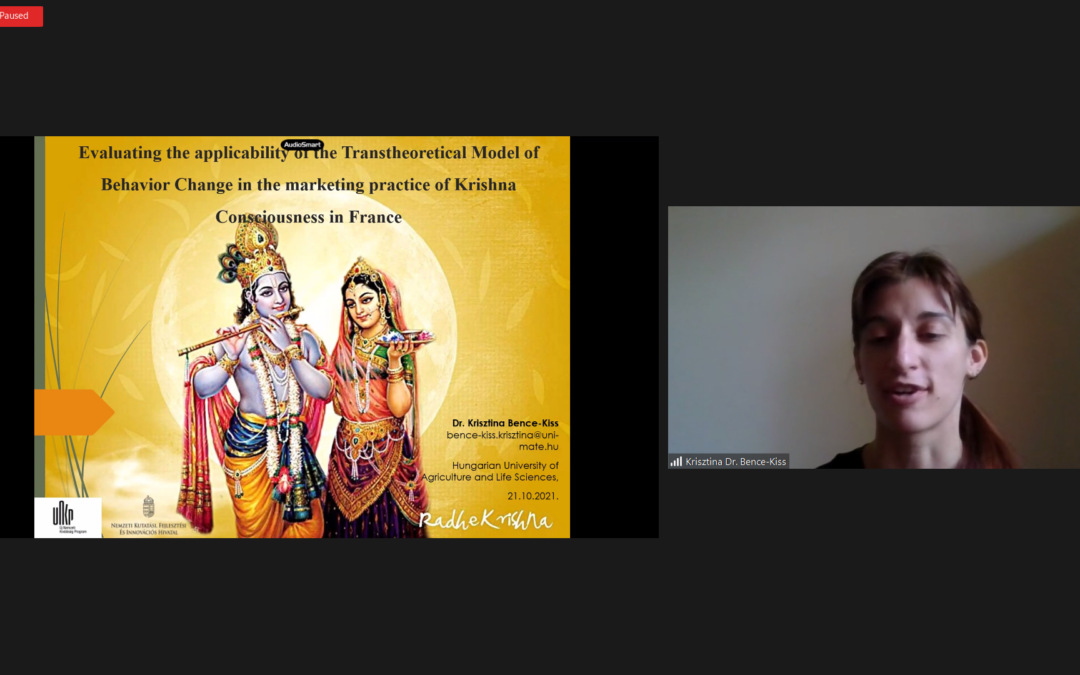Krisztina Bence-Kiss – Hungarian University of Agriculture and Life Sciences, Kaposvár, Guba Sándor u. 40., Hungary
DOI: https://doi.org/10.31410/ITEMA.2021.125
5th International Scientific Conference on Recent Advances in Information Technology, Tourism, Economics, Management and Agriculture – ITEMA 2021, Online/virtual, October 21, 2021, CONFERENCE PROCEEDINGS published by the Association of Economists and Managers of the Balkans, Belgrade; Printed by: SKRIPTA International, Belgrade, ISBN 978-86-80194-51-6, ISSN 2683-5991, DOI: https://doi.org/10.31410/ITEMA.2021
Abstract
Analyzing the promotional activities of Krishna Conscious communities of Europe a new model was discovered, in which they promote their religion by creating a tourist product in the form of rural community. The former analysis of the behaviors of the visitors of Krishna-conscious communities in numerous European countries has shown that the Transtheoretical Model of Behavior Change (Prochaska & DiClemente, 1983) may be applied to study engagement to a religious community. In this paper, this model was tested via qualitative methods of observation and in-depth interviews on the example of New Mayapur in France, evaluating whether the model is applicable similarly to the other European countries analyzed previously. The aim was to find out whether the TTM is applicable in the case of New Mayapur. The researches have shown that TTM may be applied to the case of France, just like the other European countries examined before
Keywords
Transtheoretical Model of Behavior Change; Religious marketing; Marketing religion; Marketing mix; Tourism marketing
References
Ann, S., & Devlin, J. F. (2000). American and British clergy attitudes towards marketing activities: A comparative study. Service Industries Journal, 20(4), 47–61.
Bence, K. (2014). Appearance of marketing in religion – someone, who admits it. (Master’s Thesis) Retrieved from Corvinus TDK és Szakdolgozat Gyűjtemény
Bence-Kiss, K., Szigeti, O. (2020). Evaluating the two-step marketing model of Krishna Consciousness in Hungary. Balkans Journal of Emerging Trends in Social Sciences 3(1), 56-63.
Bence-Kiss, K (2019). A Krisna-tudatú közösségek marketingmodellje Európában In: Bene, Szabolcs (Ed.) XXV. Ifjúsági Tudományos Fórum, Keszthely: Pannon Egyetem, Georgikon Kar, Állattudományi Tanszék, 1-7.
El-Bassiouny, N. (2014). The one-billion-plus marginalization: Toward a scholarly understanding of Islamic consumers. Journal of Business Research, 67, 42–49.
El-Bassiouny, N. (2016). Where is “Islamic marketing” heading? A commentary on Jafari and Sandikci’s (2015) “Islamic” consumers, markets, and marketing. Journal of Business Research, 69, 569-578. http://dx.doi.org/10.1016/j.jbusres.2015.05.012.
Hashim N., & Hamzah M. I. (2014). 7P’s: A literature review of Islamic marketing and contemporary marketing mix. Procedia – Social and Behavioral Sciences, 130, 155 – 159.
Iyer, S., Velu, C., & Mumit, A. (2014). Communication and marketing services by religious organizations in India. Journal of Business Research, 67, 59-67.
Juravle A. I., Sasu, C. & Spataru, G. C. (2016). Religious Marketing. SEA – Practical Application of Science, Romanian Foundation for Business Intelligence, Editorial Department, 11, 335-340.
Kuran, T. (1994). Economics and the Economics of Religion. Journal of Institutional and Theoretical Economics (JITE) / Zeitschrift für diegesamte Staatswissenschaft, 150(4), 769-775.
McDaniel, S. W. (1986). Church Advertising: Views of the Clergy and General Public, Journal of Advertising, 15 (March), 24–29.
McGraw, A. P., Schwartz, J. A. & Tetlock, P. E. (2011). From the commercial to communal: reframing taboo trade-offs in religious and pharmaceutical marketing. Journal of Consumer Research, 39, 157-173.
Mulyanegara, R. C., Tsarenko, Y. & Mavondo, F. (2010). Church Marketing: The Effect of Market Orientation on Perceived Benefits and Church Participation. Services Marketing Quarterly, 32(1) 60-82.
Newcomb, S. (2017). The five stages of (financial) change. Retrieved from: https://www.psychologytoday.com/au/blog/loaded/201708/the-five-stages-financial-change 14.02.2020.
Prochaska, J. O., & DiClemente, C. C. (1983). Stages and processes of self-change of smoking: Toward an integrative model of change. Journal of Consulting and Clinical Psychology, 51, 390-395.
Prochaska, J. & Velicer, W. (1997). The Transtheoretical Model of Health Behavior Change. American Journal of Health Promotion AJHP. 12. 38-48. 10.4278/0890-1171-12.1.38.
Sandikci, Ö. (2011). Researching Islamic marketing: Past and future perspectives. Journal of Islamic Marketing, 2(3), 246–258.
Sandikci, Ö., & Jafari, A. (2013). Islamic encounters in consumption and marketing. Marketing Theory, 13(4), 411–420.
Shaw, D., & Thomson, J. (2013). Consuming spirituality: the pleasure of uncertainty. European Journal of Marketing, 47 (3/4) 557-573.
Shostack, G. L. (1977). Breaking free from product marketing. The Journal of Marketing, 41(2) 73-80.
Srinivasan, R. (2012). Services Marketing – The Indian context; PHI Learning Private Limited.
Szabó S. (2016). Egészségorientált táplálkozási szokások és a fogyasztói magatartás kapcsolata. PhD Dissertation, Kaposvári Egyetem, Kaposvár, 1-196.
Szakály, Z. (2006). Egészségmagatartás, viselkedésváltozás és személyre szabott táplálkozás: az élethosszig tartó egészség koncepciója. EMOK – XXII. Országos Konferencia – Hitelesség és Értékorientáció a Marketingben.
University of Maryland (2020) The transtheoretical model of behavior change. Retrieved from https://habitslab.umbc.edu/the-model/ 12.12.2019.
Velicer, W. F, Prochaska, J. O., Fava, J. L., Norman, G. J., & Redding, C. A. (1998). Smoking cessation and stress management: Applications of the Transtheoretical Model of behavior change. Homeostasis, 38, 216-233.
Wilson, J.A.J. (2012). Looking at Islamic marketing, branding and Muslim consumer behaviour beyond the 7P’s. Journal of Islamic Marketing, 3(3) 212-216.




